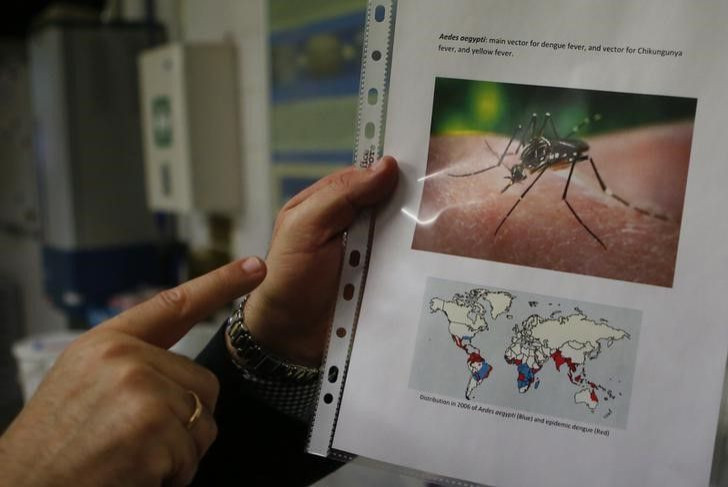CDC Cautions Pregnant Women Against Travel To Rio Olympics

(Reuters) - Pregnant women should consider not traveling to the 2016 Olympic Games in Brazil due to the risk of Zika virus infection, the U.S. Centers for Disease Control and Prevention said on Friday.
CDC also said women considering becoming pregnant, and their male partners, should exercise caution if they travel to the Olympics or Paralympic Games, scheduled to take place in Rio de Janeiro in August and September.
"CDC Recommends that pregnant women consider not traveling to the Olympics," the advisory says. "If you have a male partner who goes to the Olympics, you may be at risk for sexual transmission."
CDC's statement is the agency's first explicit warning for some travelers to stay away from the Games in Rio de Janeiro, which has been expecting to draw as many as 400,000 tourists from around the world. Although the Olympics are still five months away, Brazilian authorities have been drawing up robust mosquito-control plans to minimize the risks to spectators and tourists alike.
Still, a Zika outbreak in the Americas has caused concern among some people considering attending the Games, and CDC's advisory could increase pressure on organizers who have so far downplayed any threat that health concerns could hurt attendance.
Late on Friday, the Federal Drug Administration issued an emergency authorization for a new CDC laboratory test for the Zika virus that detects antibodies the body makes to fight infection. The CDC said it will distribute the test to qualified laboratories in the United States during the next two weeks.
Much remains unknown about Zika, including whether the virus causes microcephaly in babies, a condition defined by unusually small heads that can result in developmental problems.
Brazil said it has confirmed more than 580 cases of microcephaly, and considers most of them to be related to Zika infections in the mothers. Brazil is investigating an additional 4,100 suspected cases of microcephaly.
Though Zika is usually transmitted by mosquitoes, women who are pregnant may also be at risk for sexual transmission and should use condoms or refrain from sex during pregnancy if they are concerned, CDC said.
Those considering becoming pregnant should talk to their health care providers before traveling to the Olympics, the agency said.
A growing number of international athletes in recent weeks have said they are concerned about Zika, though few have said it would deter them from competing. Among those who have expressed reluctance is famed U.S. soccer goalkeeper Hope Solo, who said Thursday she may not join her teammates in Brazil due to concerns about Zika.
The CDC's recommendations for travel to the Olympics are in line with its current guidance to travelers considering a trip to the myriad countries where Zika is present.
Organizers have said transmission risks should be low during the Olympics, which are scheduled to take place during Brazil's winter months when transmission of mosquito-borne illnesses is less frequent and the weather is cooler and drier. Rio de Janeiro has pledged to undertake broad mosquito control efforts.
The World Health Organization declared the outbreak an international health emergency on Feb. 1, citing a likely strong relationship between Zika infection during pregnancy and microcephaly.
Earlier on Friday, the CDC said that a recent study of nine pregnant travelers from the U.S. to Zika-affected regions raised new concerns about the virus, showing a greater-than-expected number of fetal infections and brain abnormalities. One of the nine women gave birth to a child with severe microcephaly, it said.
(Reporting by Shivam Srivastava in Bengaluru and Joshua Schneyer in New York; Editing by Bernard Orr)



























